The Big Short Its Important to Understand So That It Never Happens Again
[Annotation: This is a re-mail service of our review from the AFI Film Festival; The Large Brusque opens today in select cities]
The Big Brusque —which concerns 4 groups of traders who discovered that the housing loans that held upward most of the economy were actually built on a series of repackaged, unchecked, awful loans that created the potential for the collapse of the world economy—is the outset dramatic flick forAdam McKay (Anchorman, Step Brothers). It might seem like an odd choice for him to direct but, after initially stumbling out of the gate, it works magnificently. McKay treatsThe Big Bruskevery bit vital movie house and it becomes vital cinema. It's inventive, it's funny, and it enrages. Just near chiefly, information technology informs.
Ultimately, this shouldn't exist a surprise. McKay added animated graphics to the closing credits of his Will Ferrell-Marker Wahlberg buddy cop comedy, The Other Guys , that highlighted the vice that the wealthy utilize to put the screw to the average American. Despite being educational, it felt out of place considering it didn't fully fit the project. McKay'southward impulse to include that at the terminate ofThe Other Guys is but 1 piece of show that the managing director actually wants to inform the American people about how badly they're getting screwed by financial systems.The Large Shortis the exact story that McKay needs to tell. He is passionate about the subject and The Big Shortis heady, passionate filmmaking.
McKay wants to entertain yous, sure, only he also wants you to understand every building block that allowed the market place to crash. Big banks accept mega forms for their loans that allowed this to happen and McKay breaks down the labyrinth of mumbo-jumbo via fourth-wall explanations. He's aware that this could very well happen over again—considering just one person always went to jail for the fraud that created the economic collapse of the entire earth—unless citizens are better informed about how it happened. The banks assume you can't understand it and—after being bailed out—they're already creating new terms for the same schemes that acquired the mess to begin with.
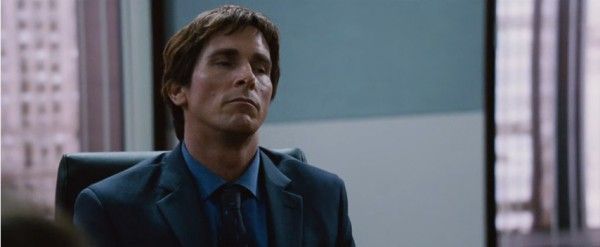
How does McKay have descriptions of sub-prime loans, CODs, etc. and turn it into bankable entertainment? The same way comic books are becoming the most bankable cornerstone of the film market: world-building. To build that world he has one of the traders, the unreliable one, Jared Vennett (Ryan Gosling) repeatedly break the quaternary wall to explain just how unchecked banks had go. Vennett (whose name was changed from Michael Lewis' volume to be more of a composite character) is over-tanned, over-caffeinated and represents the douchey trader of the 21st century. He flashes back to the 1970s to a time when cyberbanking was not lucrative or exciting and just involved forms, until one loan broker came upwardly with a scheme to lump housing loans together—preying on the American Dream of owning your own dwelling—and sell them to bidding firms. Once outside entities start making coin with the banks through this scheme neither side, of course, tin be fully quenched when they brand money hand over fist. Inevitably, the bundling scheme starts to create sub-bundles and sub-bundles of loans that go worse and worse, but goes it unchecked by boards who are supposed to monitor the activity because they themselves are worried of losing the bank's business concern.
Actually, I don't demand to explain any of this, considering the picture carefully does. It'due south a big set-up and McKay does the immense opening as a collage. It'southward a motif that's repeated throughoutThe Big Short—mixing clips of abundant wealth assorted with destitution and "For Sale" signs—that McKay does much differently than most filmmakers would. McKay inserts popular culture blips—such as aBritney Spears interview, Polyphonic Spree's softened cover of an aroused Nirvana song, iPhone packaging, viral YouTube videos, etc.—equally a reminder of all the noise that nosotros obsess over that diverts our attending away from the decadent systems of the world, and helps it become unchecked for far too long. McKay also uses pop culture figures to directly define economic terms to the audience that they demand to know in social club to become as aroused every bit they should. Gosling's Vennett introduces three unlike types of pop culture stars, I won't say who considering it spoils the surprise (but I volition say, no, McKay doesn't use frequent collaborator and co-producer Will Ferrell). It'south cute, it's entertaining, information technology's funny, only it'southward also a bright choice of McKay's to understand that his audience volition be more likely to listen to a pop culture phenomenon than they will a balding economic professor. This approach also has a cutting parallel to McKay'due south collage motif: what if pop culture actually gave us information we could utilize?
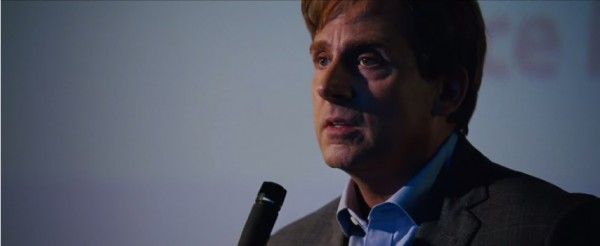
Information we can utilise is the passionate angle that McKay takes, but this isn't a documentary. McKay has a big bandage of stars. And although this is an ensemble piece, they rarely act against each other. The Big Shortfollows iv groups of "weirdos" who discovered the data that banks were hiding and decided to buy up all these atrocious loans to wager on their failure and the collapse of the government. With the exception of one story, these weirdos didn't work together, and although it'd exist bang-up to see these actors riff off each other, McKay thankfully doesn't force the story to overlap more than information technology did in real life.
The wager confronting sub-prime loans began with hedge fund director Michael Burry (Christian Bale), an awkward genius who has a drinking glass center, no social skills, calms downwardly by diggings death metallic, sleeps on the floor of his office and makes millions and millions of dollars for his clients by finding trends so early there isn't fifty-fifty a trend yet. Burry too has a clause in his contract that tin keep whatsoever of his clients from bailing ship because he needs all of their investments to move the market in the manner that he predicts. He is the first person to wager millions of people's money confronting the banks by gobbling upwardly their worst loan packages (which are given handsome percentages by the cyberbanking regulators because they're all in bed together).
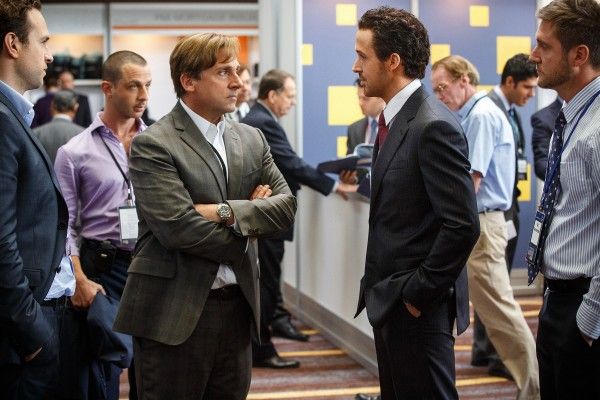
Vennett hears of Burry's purchases while other traders are out jubilant their supposed easy money from Burry (the lunatic!) and he sets out to find other hedge fund managers who will wager confronting his very own banking company (Vennett also informs us that he never would hang out with these Wall Street douchebags, his real friends are in mode). This leads him to Marking Baum (Steve Carell), who believes the entire system is corrupt, is pissed off at the earth, and after hearing Vennett's pitch (visualized via Jenga!), wants to believe that Wall Street and the banks are actually this stupid. He's in.
The 4th party, McKay hilariously introduces using a faked aha moment, when 2 garage startup financiers who've struck it big (Finn Wittrock,John Magaro) stumble upon Vennett'due south plan in a banking company antechamber and then straight tell the audience that'south non how they discovered the info, but information technology's more cinematic for them to feel closer to the other members of the movie. It'due south meta as hell, but now that we're in the prestige truthful story agenda portion of movies, it's a gleeful nudge from McKay—in his first drama—to betoken out moments that are either staged or actually happened and seem too real to believe. The two young traders apply a retired trader who despises the Wall Street organization, but tin can't get information technology out of his own system because he's and so damned adept at it (Brad Pitt).
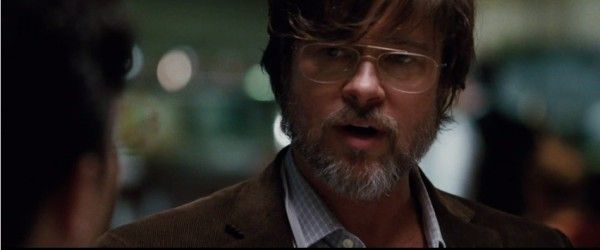
The Big Curtcovers a lot of ground. It takes a little while, only once you get used to the jittery camerawork, the collage mosaic, and are properly set up inside this world, it'south very entertaining. Simply it also punches you lot in the gut over and over over again. After hearing two hotshot traders talk almost the low income people they prey on so that they can continue to keep pumping out loans—Baum steps bated and asks his coworker why they're confessing. The response? "They're not confessing, they're bragging."
In that location's so much smugness and disgusting bragging from the bankers in The Big Shortthat you do indeed root for these four groups, fifty-fifty though they're hypocritically attempting to brand money off of the plummet of an economic system. It'due south Pitt's old mitt who reminds the younger traders the bodily implications of what they're doing, how many people will become unemployed around the globe if their predictions actually come true. He asks them non to dance, not to high five when they greenbacks in on the banks failure, information technology makes them no ameliorate than the banks; smarter, certain, but if they're enlightened of the implications perchance they'll be amend off.
The actors all excel. Bale is committed to mannerisms, Gosling is very funny, Pitt is the proper residue of excited and depressed by numbers and money, merely it is Carell who steals the picture and is given the biggest character outside of the schemes. He has a backstory of losing a brother to suicide, and he has a heartbreaking line of only offering his brother money as a way to make his life better. There are so many gems in The Big Short that I haven't been able to bear upon on (and a few falters, such as Bale's early flashbacks, some over-accent of fluid camerawork can brand the dialogue harder to process, etc.), but the biggest takeaway is that McKay does something magnificent withThe Large Shortbecause he also is horrified past the system. And he wants usa to empathise it as best nosotros tin can. There are laughs, at that place is tragedy, onlyThe Big Shortis that rare motion-picture show that uses popular culture to straight our attention to something far more important.
Rating: B+
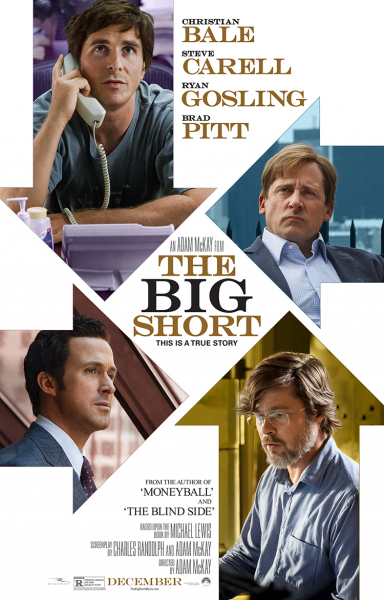
Source: https://collider.com/the-big-short-review-christian-bale-brad-pitt/

0 Response to "The Big Short Its Important to Understand So That It Never Happens Again"
Post a Comment